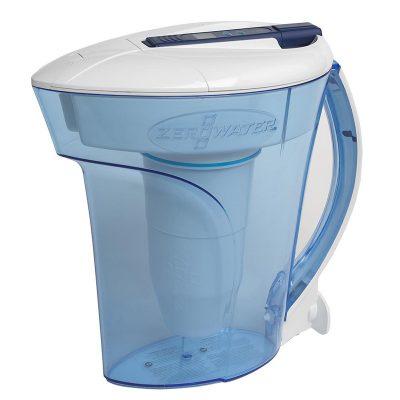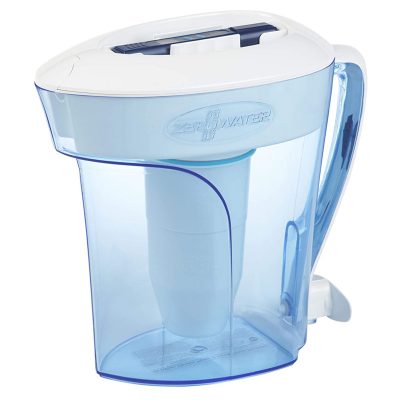Zerowater vs Brita water filters

ZeroWater and Brita produce two of the most popular pitcher filters around today. But while Brita is pretty much synonymous with the home water filter, ZeroWater is a relative newcomer to the market. Here’s a direct comparison of these two brand’s pitcher filters, to help you decide between them.
(We’ve also thrown the Pur Ultimate 11-Cup Pitcher into the comparison table, as we often find that people are debating ZeroWater vs Pur as an alternative to the Brita).
Best Overall Water Filter Pitcher
Size and capacity
10 cup (80 fl oz)Filter lifespan
120 gallonsExtra contaminants removed
Asbestos, Lead, Emerging compounds, Cadmium
What we liked
- The longest filter life around
- Unbeatable brand reputation
Things to consider
- Higher filter replacement costs (but they last longer)
- No filter lifespan indicator
Best Chlorine water filter
Size and capacity
10 cup (80 fl oz)Filter lifespan
15 gallonsExtra contaminants removed
Lead, Mercury, Chromium, Chlorine
What we liked
- NSF Certified to reduce chromium and lead
- Free TDS detector pen included
Things to consider
- Not everyone wants to filter out all Total Dissolved Solids
- Very short filter life
- No filter lifespan indicator
Top Pick Water Filter Pitcher
Size and capacity
11 cup (88 fl oz)Filter lifespan
30 gallonsExtra contaminants removed
Cysts, Lead, Emerging compounds, Copper
What we liked
- LED filter life indicator
- Removes cysts and emerging compounds
Things to consider
- Shorter filter life with a higher base pitcher cost
See how Brita and ZeroWater pitcher filters compare to other brands in our review of the Best Water Filter Pitchers of 2020.
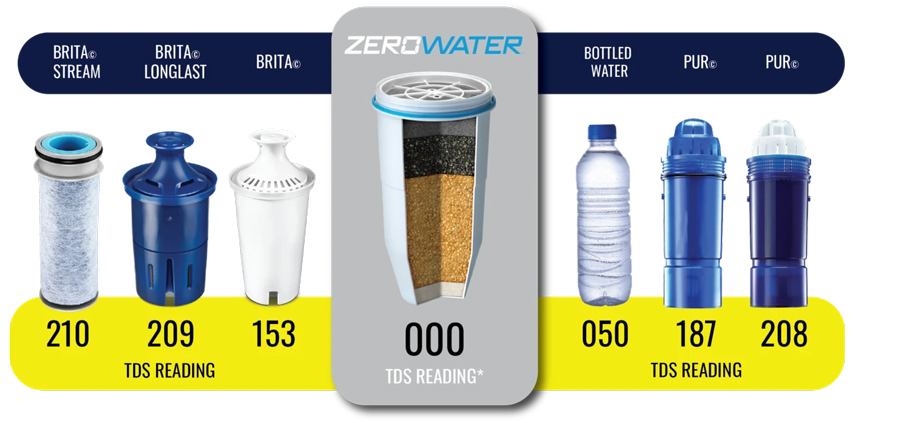
Pur Vs Brita pitcher filters
Let’s compare: |
Pur Ultimate 11-Cup Pitcher
|
Brita 10-Cup Pitcher |
|---|---|---|
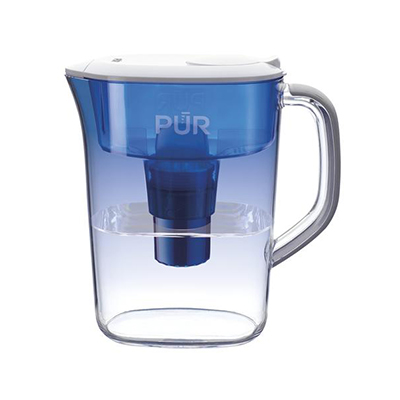 |
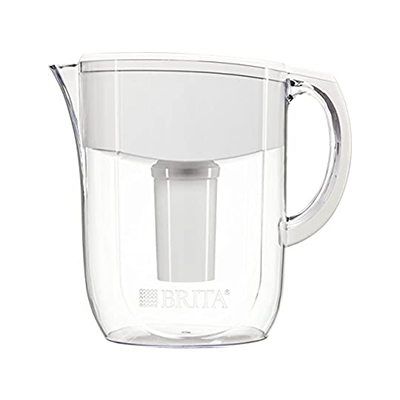 |
|
| Our pick for: | Top Pick Water Filter Pitcher | Best Overall Water Filter Pitcher |
| What we liked: |
|
|
| Things to consider: |
|
|
| Size and capacity: | 11 cup (88 fl oz) | 10 cup (80 fl oz) |
| Filter lifespan: | 30 gallons | 120 gallons |
| Extra contaminants removed: | Cysts, Lead, Emerging compounds, Copper | Asbestos, Lead, Emerging compounds, Cadmium |
| Customer reviews: | 4.1 (2,727 ratings) | 4.5 (9,032 ratings) |
| Price: | Check the latest price | Check the latest price |
Value for money
There are a few components in play when considering the value for money of a pitcher filter. First is the base price of the pitcher itself, and here, the Brita 10-cup comes in slightly cheaper than the ZeroWater model.
Next is the price of filter replacements, which will comprise the main factor in calculating value for money over the long term. At around 20 bucks per replacement cartridge, the Brita may seem far more expensive than the $13 dollar ZeroWater filter, but Brita’s much longer lifespan will soon cancel out the difference in cost.
At an estimated 120 gallons per cartridge, Brita’s filters are able to keep the clean water flowing for as long as 6 months with low to moderate use, or between 4 and 6 months for a full family. That’s a huge filter lifespan, and despite the higher price per cartridge, we think Brita provides the best long term value for money of any pitcher product, ZeroWater included. According to our data, most households will save 50% per year on filter replacements by going with the Brita.

Filter price:
$13 (approx.)
Filter lifespan:
15 gallons
Annual filter cost:
$80 (approx.)

Filter price:
$20 (approx).
Filter lifespan:
120 gallons
Annual filter cost:
$40 (approx.)
Note: estimated lifespans are based on the average tap water quality. In areas where water is particularly hard or otherwise contaminated, expect to replace filters far more frequently.
See how Brita and ZeroWater pitcher filters compare to other brands in our review of the Best Water Filter Pitchers of 2020.
Extra contaminants removed
Water pitcher filters like the Brita and ZeroWater aren’t intended for use on untreated water (that includes untreated well water), so they may not protect you from contaminants like bacteria, parasites, or significant levels of heavy metals.
However, both the Brita and ZeroWater are great when it comes to those pollutants that commonly crop up in public tap water—chlorine, organic chemicals, trace amounts of lead, etc. Each filter can effectively purify water to remove those nasty tastes and smells.
Each filter is rated by the NSF to remove health-risks as well as aesthetic contaminants, and both score highly when it comes to their ability to reduce quantities of lead in water, with the Brita being ever so slightly more effective.

Chlorine reduction:
>97.5%
Lead reduction:
>99.0%
Extra contaminants removed:
Lead, Mercury, Chromium, TDS

Chlorine reduction:
>97.4%
Lead reduction:
>99.6%
Extra contaminants removed:
Asbestos, Lead, Emerging compounds, Cadmium
When it comes to more specific contaminants, however, differences between the Brita and ZeroWater start to emerge. With its 5-stage filter that includes ion-exchange fibers, the ZeroWater is able to remove more Total Dissolved Solids (TDS) than any other pitcher filter on the market. It’s also the only pitcher filter certified by the NSF to remove both lead and chromium.
However, it should be pointed out that many drinkers actually prefer some level of TDS in their tap water. Water that’s lacking in mineral salts may be tasteless and have a slimy, unpleasant texture.
As for the Brita, it beats the ZeroWater filter for reducing important (but rare) health risks such as asbestos and cadmium.
There are a couple of contaminants that some pitcher filters can tackle, which neither the Brita nor ZeroWater cover. One of these is Cysts—small pockets in water that can house microorganisms and parasites. Whether you actually need a pitcher filter capable of removing cysts is something you’d likely already know, but if you do, we’d recommend going with the Pur Ultimate 11-cup versus either of the two filters featured in this review.
ZeroWater ZD: N/A
Brita 10-Cup Pitcher: N/A
Pur Ultimate 11-Cup: Yes
Anything else?
Any water filter product worth considering will make a Performance Data Sheet publicly available. These sheets contain the fine details on exactly what contaminants a product is capable of removing. Here are the data sheets for each product (including the Pur for good measure), so you can directly compare all the details of Brita vs ZeroWater vs Pur.
- Here’s the Performance data sheet for the Pur pitcher filter.
- Here’s the Performance data sheet for the Brita Longlife pitcher filter
- Here’s the Performance data sheet for the ZeroWater-ZD.
NSF Certification
Here’s a quick recap on NSF standards, and which contaminants they refer to. Remember, NSF certifications only apply to those contaminants listed by the filter manufacturer, not every contaminant in a category.
| Common contaminants | Relevant NSF standard | Products certified or tested to NSF standards |
|---|---|---|
| Harmful contaminants such as Lead, Asbestos, Arsenic, Mercury, Cysts, VOCs, etc. | NSF 53 | |
| Chlorine and Chloramines, unwanted odors, water cloudiness | NSF 42 | |
| PFAS | NSF P473 |
|
| Emerging contaminants | NSF 401 |
Our verdict
Both the Brita 10-cup pitcher and the ZeroWater ZD-01RP offer good quality filtering at an affordable price, and we think that most people will be satisfied with either product.
However, there are a couple of factors that distinguish one from the other. If value for money is your primary criteria, then we’d recommend the Brita, with its unbeatable filter lifespan and reasonable filter replacement cost.
On the other hand, if filtering for heavy metals and other Total Dissolved Solids is your main concern, then the ZeroWater ZD-010 provides best-in-class filtering. We also like how the ZeroWater includes a TDS detector pen so that you can test the filter quality yourself.
Summed up? We think the Brita 10-cup is the best water pitcher filter for dealing with common contaminants such as chlorine and traces of lead. For specific contaminants like TDS or cysts, the ZeroWater and Pur filters offer more impressive filtering power.
Check out the latest prices of the Brita 10 Cup Pitcher and the Zero Water ZD now.


